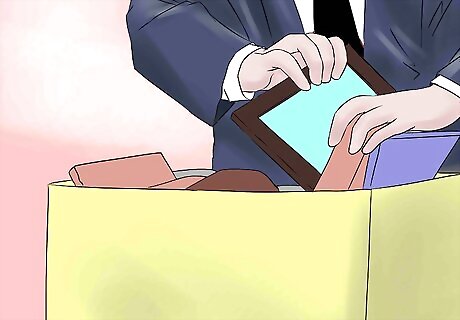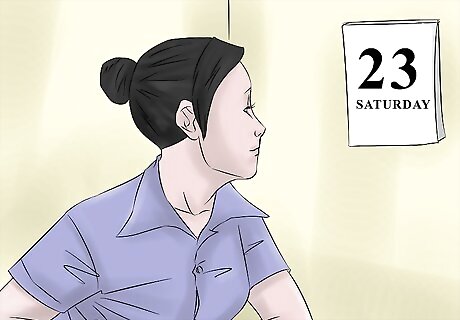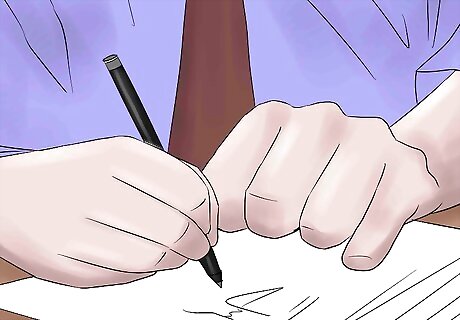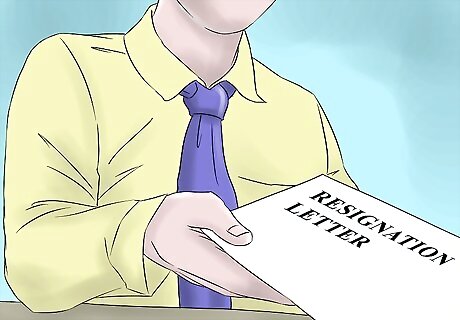
views
Preparing to Resign

Determine the details to make sure you don't flip-flop. Before you announce your resignation to anyone you must have your plans in order. The last thing you want to do is give false or changing information throughout the process of leaving. If you don’t have all your details in order, you can make it harder for your employer to hire a replacement and plan for your departure. A situation such as this may lead to ending your employment on bad terms with a bad reference and/or a disbelief that you are actually leaving with a chance of being asked to leave. Be absolutely sure you are resigning. Whether you have another job or are leaving for other reasons, it is important to stick to the plan once you have made an announcement.

Give two weeks notice to leave on a good note. Know your exact last day and follow the two weeks or more notice rule. It is most important for your current and future employer (if there is one) to have a solid date of when you are leaving your current job. For most companies and positions, a 2 week notice is standard and acceptable. However, your company may require more time due to job specific circumstances. For example, if you are the only one in the IT department, you most likely will be asked to stay longer than 2 weeks to allow the employer to find a replacement.

Ask for time off to attend to personal matters. If you need to attend to personal matters, make sure you give your employer dates or times you may need to take care of personal matters prior to your resignation. For example, if you are moving out of state or resigning due to an illness, your employer may be flexible in giving you some time off to take care of personal matters.

Plan to stay till your last day. Once you have announced your resignation, it may be hard to stay as long as you have agreed to. This can be for many reasons, including being over your current job or being anxious to start a new one. If you leave your current job prior to the time you agreed to stay, it will most likely be considered insubordination. This will render you ineligible for rehire and can present a bad reference issue in the future.

Write a signed letter of resignation. A letter of resignation is generally very brief and to the point. In your letter of resignation, include the following: A formal salutation to your supervisor and/or others notified. For example, “Dear Ms. Smith”. A statement that expresses you are leaving the company. For example, “This letter is to inform you that I am leaving my position as Project Manager”. Your last date of employment. For example, “…as of September 5, 2014”. A thank you to the employer for the opportunity to work for/with them. For example, “Thank you for providing me with the opportunity to develop my knowledge, skills and abilities within the industry.” A sincere closing such as “Many Thanks” or “Sincerely”. Your signature and printed name.

Request a meeting with your manager and/or human resources. First, know who you must notify. Most likely, it will just be your direct supervisor. However, some circumstances may require a member of HR to be present as well. For example, if you are leaving due to a conflict with your supervisor or an issue known by HR. Once you know who must be in that meeting, request their time. It is best to hold this meeting face to face if you are in the same office or your location is close. A phone call will do if you are not in close proximity. For example, if you would have to drive over 4 hours or fly to speak to your supervisor. When requesting a meeting, you do not need to say why. All you have to say is, “Can I have a little of your time today to discuss something?”
Finalizing Your Resignation

Thank them for taking the time to meet with you. Since the meeting was by your request, you should be the one to control it. To set a good tone, you should thank the members for taking time out of their day to speak with you. For example, “I understand you are very busy today, so thank you for taking the time to meet with me”.

Break the news. Simply explain that you have decided to leave the company. Although it is not required, you can choose to provide a brief explanation as long as it will not create a negative situation. For example you can say, “I have decided to leave the company to pursue another opportunity” or “I have chosen to leave the company for personal reasons”. Then, give your last date of employment. As described above, you can provide the standard 2 week notice unless you are required to provide a longer notice.

Thank them for the opportunity to learn and grow with the company. Many jobs provide the employee with valuable knowledge and experience that will most likely contribute to their next career move. It is important to recognize this and convey your gratitude. If you do so, you will leave a good lasting impression.

Offer your assistance to find and/or train your replacement to ease the transition. If you are leaving on good terms and want to help the company or your replacement, you can offer your assistance. Offering your assistance in hiring or training your replacement takes a load off of others who may not understand everything you do in a day. Your employer may not take you up on your offer but the offer itself shows that you are courteous and loyal to the company.

Request a letter of recommendation. If you are leaving on good terms, it may be beneficial to ask for a letter of recommendation. This is a good idea even if you do not need the letter at this time. You never know how many references a future employer will request. Therefore, it is best to request a letter of recommendation while your work is still fresh in your supervisor’s mind.

Ask questions about next steps. Each company has their own procedures when someone resigns. If during the meeting these procedures are not explained to you, you should ask. For example, “So what are the next steps?” or “Are there any special procedures I need to follow from now until my last day?” Some important information to obtain includes: If there will be an exit interview. An exit interview allows an employee who is leaving to provide the company with constructive criticism and other feedback. What the procedure is to return company property (phone, car, laptop, tablet, etc.). What paperwork, if any, is needed to be signed.

Submit your signed resignation letter. Nearing the completion of the meeting, hand over a signed resignation letter. The letter must include the details described above, which you should have also verbally expressed. This letter will be kept in your personnel file.

Refrain from lying. You must remain truthful throughout your resignation process. If you do not want to disclose too much information, it is best to provide vague information or not say anything at all. For example, if you do not want to explain that you are resigning because you do not believe the company is ethical, you can just say you are leaving for personal reasons. Being vague is better than lying about having to take care of a family member.

Don't list all the negatives about your work. It is best to keep the meeting as positive as possible and not provide your employer with numerous negative reasons for your departure. If in fact you are leaving because of an issue, it is OK to express that. However, it is one thing to state it and another to go on and on with a list of negatives that contributed to you leaving.

Be modest to avoid sounding arrogant. Don't gloat over your new position or life choice. If you are excited about the next steps in your life or professional career, it is natural to want to discuss with others. However, during your meeting and before your last day, it is important to keep your expression of these feelings low key. If you constantly talk about it, you may produce negative feelings surrounding your departure, such as resentment or anger.

Remain courteous. No matter what the circumstances are, it is imperative to remain as courteous and respectful as possible, from the time you have decided to resign through your last day on the job. You never know who knows who or when you will need to interact with these people again. For your career and reputation, it cannot be stressed enough how important it is to remain professional, even when it is very tough to do so.



















Comments
0 comment